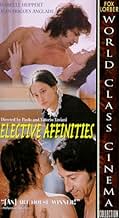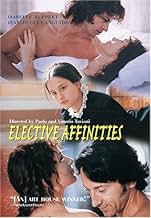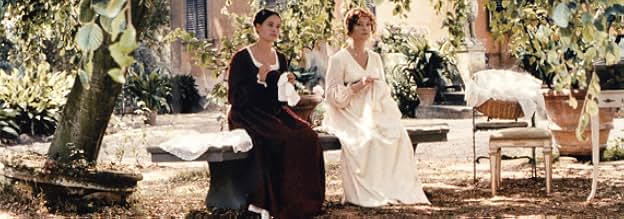Füge eine Handlung in deiner Sprache hinzuThe novel (1809) by Johann Wolfgang von Goethe. The marriage of Edward and Charlotte gets worse with the arrival at the castle Young Ottilia, grandson of Carlotta, and Brass. Edward is attra... Alles lesenThe novel (1809) by Johann Wolfgang von Goethe. The marriage of Edward and Charlotte gets worse with the arrival at the castle Young Ottilia, grandson of Carlotta, and Brass. Edward is attracted to Ottilia, Carlotta by Otto. The action is moved from Germany to Tuscany San Miniato... Alles lesenThe novel (1809) by Johann Wolfgang von Goethe. The marriage of Edward and Charlotte gets worse with the arrival at the castle Young Ottilia, grandson of Carlotta, and Brass. Edward is attracted to Ottilia, Carlotta by Otto. The action is moved from Germany to Tuscany San Miniato and Poggio a Caiano and moved chronologically Napoleonic era (but the finishing touches a... Alles lesen
- Regie
- Drehbuch
- Hauptbesetzung
- Auszeichnungen
- 2 Gewinne & 10 Nominierungen insgesamt
- Narrator
- (Synchronisation)
Empfohlene Bewertungen
Is the author moving his characters around the chessboard for fun, so we can laugh at their foibles, or is he in deadly earnest about the destructive effects of our strongest emotions? Or should we see a bit of both, enjoying some of the comedy in the initial conflicts of love and duty (to name just two) but deeply sorry at the end over lives lost or blighted? It is a complex work of many layers, too many to discuss here.
A film can only show elements of the story and has to leave out much. Rightly, in my view, it is centred on the basic equation of the middle- aged couple A and B inviting into their quiet lives the unmarried C and D. Sticking to the human trajectory, that goes from innocent love through forbidden love to tragic deaths, it can only hint at or has to ignore many other aspects of the novel: social, cultural, scientific, religious and philosophical.
Perhaps this is why some viewers have not felt satisfied? Is there an appetite for doomed love affairs among rich people in Europe two hundred years ago? I suggest that there will always be if, like this one, they are well told, well cast and well shot (even though the baby's red wig was a bit over the top!).
I don't care about state subsidies or whatever, as long as it results in some movie. Culture has to be subsidized anyway, the (mass) market mechanism, under capitalist relations, cannot supply it.
Let me quote a passage from Goethe's novel, Elective Affinities (1808) found in Bartlett's Familiar Quotations that goes a long ways toward explaining why Carlotta (Huppert) does not immediately divorce her cheating husband and take up with the dashing architect: "The sum which two married people owe to one another defies calculation. It is an infinite debt, which can only be discharged through all eternity." Carlotta represents Goethe's point of view.
I would also like to note that this is not Huppert at her best. She is too much long of face, and that sly cynicism of hers is a little too much on display. Additionally (I guess I can't help but review this a little!) the self-satisfied privilege of the upper classes depicted here allows one to understand the reasons for the revolutions that would again and again threaten the old order in Europe throughout the nineteenth century and into the twentieth.
(Note: Over 500 of my movie reviews are now available in my book "Cut to the Chaise Lounge or I Can't Believe I Swallowed the Remote!" Get it at Amazon!)
Wusstest du schon
- VerbindungenVersion of Die Wahlverwandtschaften (1974)
Top-Auswahl
Details
- Erscheinungsdatum
- Herkunftsländer
- Offizielle Standorte
- Sprache
- Auch bekannt als
- Elective Affinities
- Produktionsfirmen
- Weitere beteiligte Unternehmen bei IMDbPro anzeigen
Zu dieser Seite beitragen



























